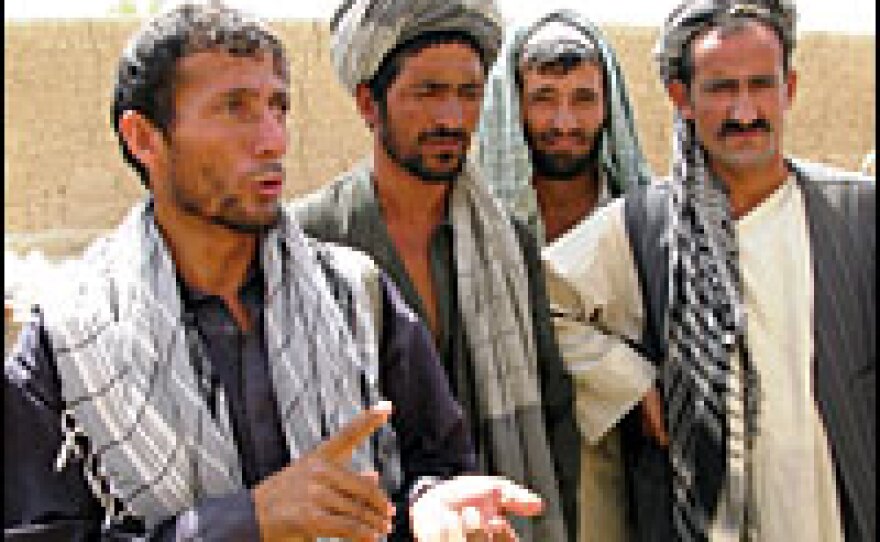
In Afghanistan, a lingering drought has led to the smallest wheat harvest in the country in years. Officials say the shortfall is nearly 1.7 million tons. Compounding the dilemma is a global spike in food prices.
Millions of Afghans are now in danger of going hungry, and the international community is responding to the crisis.
The U.S. recently donated 50,000 tons of wheat, but experts warn this kind of crisis will happen again unless the Afghan government and international donors start paying more attention to the country's farmers.
Frustration Growing
The only thing growing in a village in northern Kunduz province is frustration. Farmers complain the drought has left them without enough wheat to eat, let alone sell, this winter.
This is the worst drought any one can remember, and looking at the brown fields it is easy to see why farmers are distressed. One field was a wheat field, but there was not enough rain and water in the canal, so farmers tried planting okra and melons. Those crops didn't take either, so now the field is just mounds of dirt that stretch for acres.
Mohammad Yusuf heads an informal farmers' cooperative called "Beggars' Gathering." He takes his anger out on dried okra stems sticking out of the dirt by snapping them in half.
Yusuf says rain touched their fields maybe twice this year, and he says other than providing some seed, his government has done nothing to help.
Abdul Aziz Nikzad, the agricultural director in Kunduz province, says he empathizes with Yusuf.
Nikzad says his province used to be called the wheat warehouse of Afghanistan, but not anymore.
Mistrust In The Ministries
Nikzad blames the drought and the government in Kabul for not acting more quickly to help farmers. He says the various ministries don't trust one another: When his superiors at the Agriculture Ministry told him to rent tankers five months ago to help get water to dying livestock, he is still waiting for the Finance Ministry to give him the money.
"The ministries with money act like warlords guarding their personal coffers," Nikzad says. "There's so much red tape and micromanaging that there's little I can do to help the farmers."
Nikzad is still waiting to hear whether they will give him money to dig the three wells he needs to keep his 250-acre government farm alive. He says he has to dig those wells by next month or he'll miss the deadline for planting next season's wheat.
For now, the only water at the farm is pumped through a four-inch fire hose donated by the French. The water comes from the farm's lone well.
A farm worker uses the water to plant a small field of almond, apricot and other saplings. It's the only field in sight where anything is growing.
'A Blessing In Disguise'
Tekeste Ghebray Tekie, the U.N.'s Food and Agriculture Organization representative based in Kabul, says of the billions of foreign dollars spent on rebuilding Afghanistan, only a few hundred million have gone to improving agriculture.
But, Tekie says, the drought and soaring wheat prices served as a wake up call about the dangers of ignoring agriculture in a country where 80 percent of the population is dependent on farming.
"I call it a blessing in disguise," Tekie says. "For one thing, it brought attention to agriculture. For another, farmers may switch from poppy to growing crops or wheat. So maybe there's an opportunity there from the crisis."
Many say that wheat at this stage is becoming more lucrative than opium poppy, and the key is to help poppy farmers make the switch. Still, there are a lot of questions about what Afghan agriculture should look like.
U.S. officials are interested in seeing farmers focus more on cash crops like fruit and nuts that grow better and will boost the economy.
"You grow a little wheat, and you eat it; and then you grow tree fruits and other kinds of things, and you sell those for cash; and that's kind of the relationship," says Loren Stoddard, the director of alternative development and agriculture at the U.S. Agency for International Development in Kabul. "So wheat's important to people, but it's really not anything that's going to generate revenues and jobs really — economic progress."
Still, USAID officials are working to ease the wheat shortage in Afghanistan. They say they will roll out an up to $60 million voucher program later this month. Farmers can use the vouchers to buy seed and fertilizer at a hefty discount.
Copyright 2022 NPR. To see more, visit https://www.npr.org. 9(MDAzMjM2NDYzMDEyMzc1Njk5NjAxNzY3OQ001))







